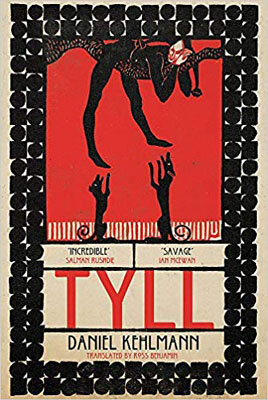I sometimes find it challenging to read historical novels which concern particular wars or political movements when I don’t have much knowledge of these past events. I like to get fully immersed in a story and it’s hard to do that if I feel like I frequently have to check Wikipedia to understand a historical context or situation. This is why it took me so many years to get into “Wolf Hall”. Daniel Kehlmann’s novel “Tyll” concerns The Thirty Years War, German folklore and other subjects from 1600s central Europe that I have even less knowledge about than the Tudor period! But I didn’t mind that so much because the characters (many of whom are compelled by superstitious beliefs) are so engaging and its story of witch trials and the power struggles of self-entitled monarchs is so compelling. It meant I was completely charmed by the book even if I didn’t fully understand the intricacies of several sections. Also, while this novel begins like a biographical account of Tyll Ulenspiegel, a prankster from numerous German folk tales, it is Elizabeth Stuart, an English noblewoman who was briefly Queen of Bohemia and popularly known as the “Winter Queen”, who emerges as the true hero of the novel.
Tyll is raised in tragic circumstances. He's the son of a miller who is put on trial for being a warlock where a string of witnesses are forced to testify against him under intimidation and torture. From this Tyll comes through as a canny individual who has the ability to survive deadly circumstances. But also, as a prototypical trickster and professional jester, Tyll imbues this novel with a wicked sense of humour. He harbours grudges against those who abuse their power and subverts that by mocking them to their faces like a comedy roasting using satirical or even scatological jokes. It was probably the only way to speak truth to power at the time without getting your head chopped off.
So he's an interesting character who avoids the fate of many who died at the time because of plague, war or religious persecution. But, just as Tyll evades being captured or killed in several situations, he also slyly slips out of the narrative for much of the later parts of this novel and only pops back into the story occasionally to disrupt or comment on the proceedings. The novel comes to focus more on Frederick V and Elizabeth Stuart, two high ranking figures of European nobility and royal blood who briefly ruled as King and Queen of Bohemia, but they were forced to abdicate these roles after only one Winter. The politics surrounding this are quite complex and it's something I did have to do a lot of extra reading on just to grasp the circumstances. That's definitely not a bad thing because it is really interesting, but it did pull me out of the story a bit and means a rereading would probably make the experience of this novel more pleasurable.
The main point is that Elizabeth Stuart is such a fascinating historical figure who I hadn't known about before reading this novel. She was the daughter of James VI and Anne of Denmark, highly educated, spoke several languages and had a special passion for reading and literature. I enjoyed how the novel depicts her tricky political status and the personal difficulties this caused for her as she realised she was in a position where she could dramatically alter the fate of history. She comes across as an astute figure who cleverly knows how to survive difficult circumstances just as Tyll does. Whereas some of the main rulers at the time such as her husband Frederick V and Gustavus Adolphus of Sweden come across more as bumbling or blowhard potentates playing with power. But Elizabeth is quite strategic in her movements during her extended exile after she and her husband are deposed. I'll be keen to read more about her and it appears several biographies and books about her exist.
With the shifts in focus and leaps in time throughout the novel it did come across as somewhat uneven to me. But overall I was enraptured by the story and writing which is moving, richly evocative and deeply thoughtful all at once. This novel is a strong contender from this year’s Booker International prize list and I'll be keen to read Kehlmann's previous novels.








